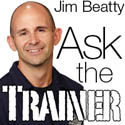I've enjoyed running for the past ten years or so in part because it's free, relatively quick and it's convenient. I probably run about 5 miles, four or five times a week. But now that I'm in my early 50s, I worry about overuse injuries. How can I prevent them? Is it safer for me, in the long run, to switch to a different form of exercise?

There's a lot of discussion about the dangers of running. "Running is bad for your knees, or bad for your back, or bad for your feet." The truth is that our bodies are made to move, and running is a type of movement. Running is not the problem. The problem lies in the build up of weaknesses and bad habits that lead to weakness. There is definitely impact and repetitive stress to consider, but again running isn't the problem; running with bad form is the problem. Pay attention to your mechanics, and try to get them as right as possible. If you have questions about running form and good mechanics, it pays to speak to a professional.
There are a couple of things that you can do on your own to help your body better handle the stresses of running. The most important thing you should do is practice your balance. Stand on one foot and try to reach different objects around you at various heights. I know it may sound silly, but believe me, it's true. The majority of our standing life happens on one foot, and running is no different. Practicing your balance will tune up the neuromuscular connections and make the small muscles that help to absorb shock better able to do their job. The more the muscles (both big and small) can do, the less the joints will bang around. This will result in less impact on the joints, less breakdown, and better performance.
Your other homework assignment to improve your running is to strengthen all the muscles of the core. This doesn't just mean do some crunches. It means to train the middle part of your body to be able to stay “stiff”, which again will lead to less impact, less stress on your body, and better performance. Crunches, bridges, front and side planks, running mechanics and coordination exercises are all important.
Lastly, it pays to vary your runs. There are many variables besides how far you run. How fast, how long, flat ground vs. hills, grass, dirt, or pavement, etc… I encourage you to stagger your runs too. You can keep doing your 4-5 miles, but put in some shorter runs at a faster pace. Maybe run a mile as quickly as you can, or go for an interval-type run, where you alternate between sprints, jogs, and walks. Throw some bike rides or swims into the mix as well. They're good cardiovascular challenges with less impact. The more ways you can challenge your body, the better it will be able to handle life.
Remember… Running is not enough. It's only one of the three parts of the synergistic puzzle. We still have to maintain our muscle, especially as we age, and we need to eat in a way that supports our lifestyle. Running can be stressful, and unless we put back the fuel and give our bodies the nutrients they need, we'll break down faster than we can repair and eventually end up injured and/or with dis-ease.





